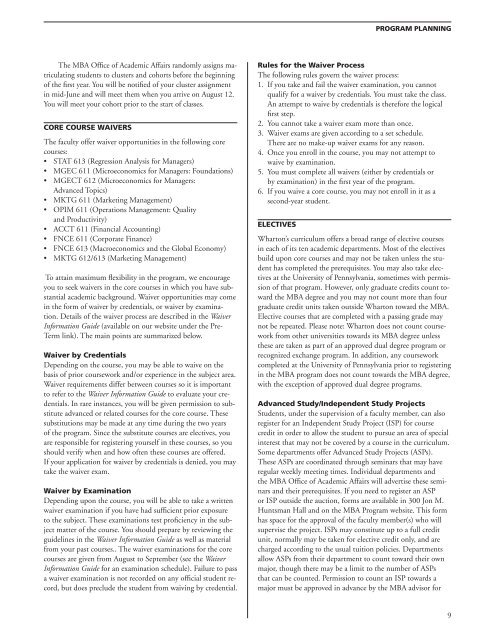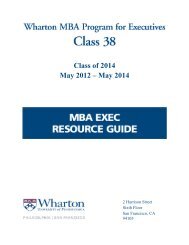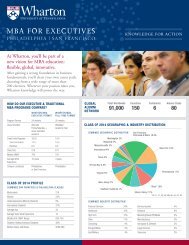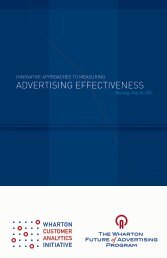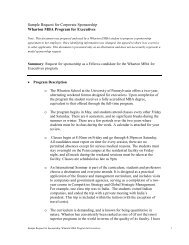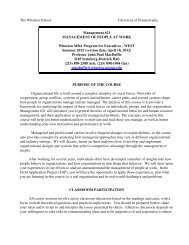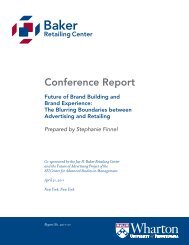Explore Options; Plan Your MBA Academic Program
Explore Options; Plan Your MBA Academic Program
Explore Options; Plan Your MBA Academic Program
Create successful ePaper yourself
Turn your PDF publications into a flip-book with our unique Google optimized e-Paper software.
The <strong>MBA</strong> Office of <strong>Academic</strong> Affairs randomly assigns matriculating<br />
students to clusters and cohorts before the beginning<br />
of the first year . You will be notified of your cluster assignment<br />
in mid-June and will meet them when you arrive on August 12 .<br />
You will meet your cohort prior to the start of classes .<br />
CORE COURSE WAIVERS<br />
The faculty offer waiver opportunities in the following core<br />
courses:<br />
• STAT 613 (Regression Analysis for Managers)<br />
• MGEC 611 (Microeconomics for Managers: Foundations)<br />
• MGECT 612 (Microeconomics for Managers:<br />
Advanced Topics)<br />
• MKTG 611 (Marketing Management)<br />
• OPIM 611 (Operations Management: Quality<br />
and Productivity)<br />
• ACCT 611 (Financial Accounting)<br />
• FNCE 611 (Corporate Finance)<br />
• FNCE 613 (Macroeconomics and the Global Economy)<br />
• MKTG 612/613 (Marketing Management)<br />
To attain maximum flexibility in the program, we encourage<br />
you to seek waivers in the core courses in which you have substantial<br />
academic background . Waiver opportunities may come<br />
in the form of waiver by credentials, or waiver by examination.<br />
Details of the waiver process are described in the Waiver<br />
Information Guide (available on our website under the Pre-<br />
Term link) . The main points are summarized below .<br />
Waiver by Credentials<br />
Depending on the course, you may be able to waive on the<br />
basis of prior coursework and/or experience in the subject area.<br />
Waiver requirements differ between courses so it is important<br />
to refer to the Waiver Information Guide to evaluate your credentials<br />
. In rare instances, you will be given permission to substitute<br />
advanced or related courses for the core course . These<br />
substitutions may be made at any time during the two years<br />
of the program . Since the substitute courses are electives, you<br />
are responsible for registering yourself in these courses, so you<br />
should verify when and how often these courses are offered .<br />
If your application for waiver by credentials is denied, you may<br />
take the waiver exam .<br />
Waiver by Examination<br />
Depending upon the course, you will be able to take a written<br />
waiver examination if you have had sufficient prior exposure<br />
to the subject . These examinations test proficiency in the subject<br />
matter of the course . You should prepare by reviewing the<br />
guidelines in the Waiver Information Guide as well as material<br />
from your past courses . . The waiver examinations for the core<br />
courses are given from August to September (see the Waiver<br />
Information Guide for an examination schedule) . Failure to pass<br />
a waiver examination is not recorded on any official student record,<br />
but does preclude the student from waiving by credential .<br />
PROGRAM PLANNING<br />
Rules for the Waiver Process<br />
The following rules govern the waiver process:<br />
1 . If you take and fail the waiver examination, you cannot<br />
qualify for a waiver by credentials . You must take the class .<br />
An attempt to waive by credentials is therefore the logical<br />
first step .<br />
2 . You cannot take a waiver exam more than once .<br />
3 . Waiver exams are given according to a set schedule .<br />
There are no make-up waiver exams for any reason .<br />
4 . Once you enroll in the course, you may not attempt to<br />
waive by examination .<br />
5 . You must complete all waivers (either by credentials or<br />
by examination) in the first year of the program .<br />
6 . If you waive a core course, you may not enroll in it as a<br />
second-year student .<br />
ELECTIVES<br />
Wharton’s curriculum offers a broad range of elective courses<br />
in each of its ten academic departments . Most of the electives<br />
build upon core courses and may not be taken unless the student<br />
has completed the prerequisites . You may also take electives<br />
at the University of Pennsylvania, sometimes with permission<br />
of that program. However, only graduate credits count toward<br />
the <strong>MBA</strong> degree and you may not count more than four<br />
graduate credit units taken outside Wharton toward the <strong>MBA</strong> .<br />
Elective courses that are completed with a passing grade may<br />
not be repeated . Please note: Wharton does not count coursework<br />
from other universities towards its <strong>MBA</strong> degree unless<br />
these are taken as part of an approved dual degree program or<br />
recognized exchange program . In addition, any coursework<br />
completed at the University of Pennsylvania prior to registering<br />
in the <strong>MBA</strong> program does not count towards the <strong>MBA</strong> degree,<br />
with the exception of approved dual degree programs .<br />
Advanced Study/Independent Study Projects<br />
Students, under the supervision of a faculty member, can also<br />
register for an Independent Study Project (ISP) for course<br />
credit in order to allow the student to pursue an area of special<br />
interest that may not be covered by a course in the curriculum .<br />
Some departments offer Advanced Study Projects (ASPs) .<br />
These ASPs are coordinated through seminars that may have<br />
regular weekly meeting times . Individual departments and<br />
the <strong>MBA</strong> Office of <strong>Academic</strong> Affairs will advertise these seminars<br />
and their prerequisites . If you need to register an ASP<br />
or ISP outside the auction, forms are available in 300 Jon M .<br />
Huntsman Hall and on the <strong>MBA</strong> <strong>Program</strong> website. This form<br />
has space for the approval of the faculty member(s) who will<br />
supervise the project . ISPs may constitute up to a full credit<br />
unit, normally may be taken for elective credit only, and are<br />
charged according to the usual tuition policies. Departments<br />
allow ASPs from their department to count toward their own<br />
major, though there may be a limit to the number of ASPs<br />
that can be counted . Permission to count an ISP towards a<br />
major must be approved in advance by the <strong>MBA</strong> advisor for<br />
9


